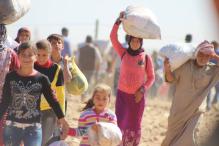Today’s civil wars are becoming more frequent, more harmful to civilians and harder to resolve. Why are sustainable peace outcomes proving more elusive? One contributing factor to these trends may be the increasing use of pro-government militias (PGMs) in armed conflict.
Auxiliary forces have played crucial roles in helping governments win back territory, weaken rebel forces or consolidate battlefield strength. They are a quick and cheap means of mobilizing force and may offer unique local knowledge and intelligence, building greater traction among contested communities or constituencies. In some situations, States may turn to PGMs to outsource the “dirty work” of war while maintaining plausible deniability for human rights violations. However, the use of PGMs carries significant risks in terms of post-conflict peace and stability.
Research has shown that the use of PGMs as counter-insurgents can make conflicts last longer, with higher levels of violence and greater risks of relapse. PGMs exploit conflict situations for their own economic and political gain and may become spoilers to any peace process that would curtail those benefits, especially where they are excluded in political talks and integration deals. More broadly, using PGMs may entrench certain forms of violence, corruption and impunity that can last beyond a peace deal, undermining longer-term peacebuilding efforts and contributing to a higher likelihood of relapse into violent conflict. Indeed, the strong links between militias and a range of regional powerbrokers often means that PGMs embroil countries in regional and even international competitions, with far greater risks to stability.
Conflicts involving PGMs present policymakers and practitioners with a set of strategic and operational choices. While national governments and international partners often have different and competing rationales for collaborating with militias, they broadly make the decision to do so for four reasons: as inexpensive force multipliers; due to their superior local knowledge; avenues for legitimacy or coercion that are otherwise unavailable in weak or contested States; and where they wish to maintain plausible deniability for human rights violations.
PGMs cannot be considered flash-in-the-pan responses to insecurity; instead, they are an increasingly permanent feature of the landscapes of twenty-first century conflicts. Their utility allows them to become indispensable actors, tied to the main sources of power in the capital and the broader region. Resilient in the face of efforts at demobilization and integration, PGMs appear to be most comfortable in the penumbra of the State, drawing resources and cover from weak governments, while being subject to none of the usual constraints on their behaviour.
Based on in-depth field research in Iraq, Nigeria and Somalia, this report aims to understand the role of PGMs in conflict and post-conflict settings. Specifically, it investigates how PGMs might help or hurt prospects for sustainable peacebuilding.
The research finds that PGMs can be a double-edged sword: in the short-term, they may meet immediate security demands, but over time they can present significant consequences to peace and stability in four areas: undermining the State capacity and authority; the risk to civilians and the rule of law, contributing to further instability; through illicit networks and agents of criminal enterprises; and the polarizing forces in local communities and regions of PGMs. Taken together, the presence of PGMs may tend to make a conflict last longer, produce increased levels of violence and abuse and make the post-conflict period more volatile.
While each country is unique — in both the nature of its conflict and the ways in which PGMs have been brought into play — they share common themes. A comparison across the three case studies reveals a number of important considerations for policymakers and practitioners.
This report builds upon original field research on three PGMs used in government-led counter-insurgency and counter-terrorism strategies: Nigeria’s Civilian Joint Task Force (CJTF), Iraq’s Popular Mobilization Units (PMU) and Somalia’s darwish forces, amongst others. It also draws from earlier commissioned fieldwork for UNU-CPR's The Limits of Punishment project, involving the same three countries.
Access Hybrid Conflict, Hybrid Peace: How Militias and Paramilitary Groups Shape Post-Conflict Transitions here.
This material has been funded by UK aid from the UK Government; however, the views expressed do not necessarily reflect the UK Government’s official policies.
Suggested citation: Hybrid Conflict, Hybrid Peace: How Militias and Paramilitary Groups Shape Post-Conflict Transitions : UNU-CPR, 2024.


